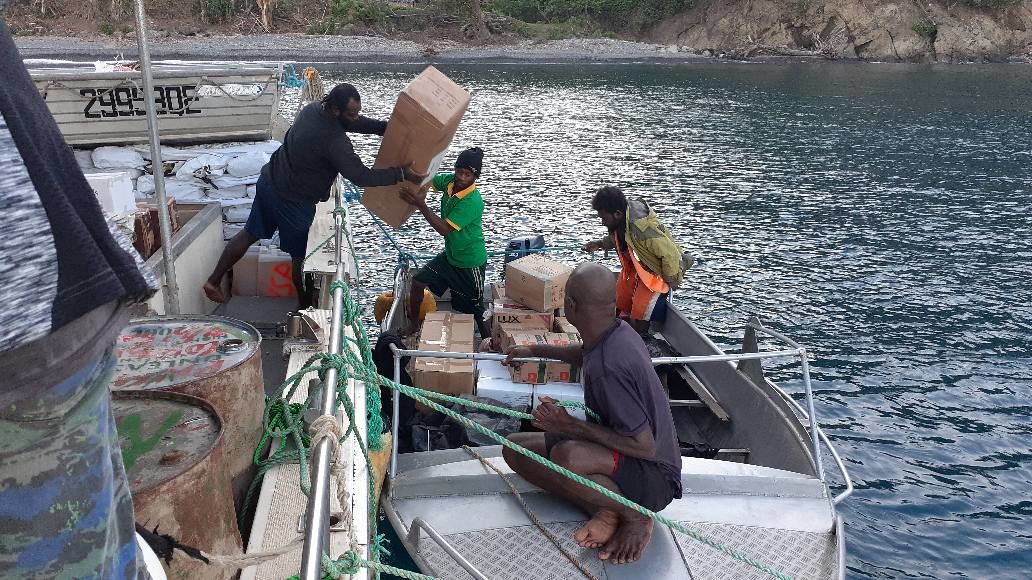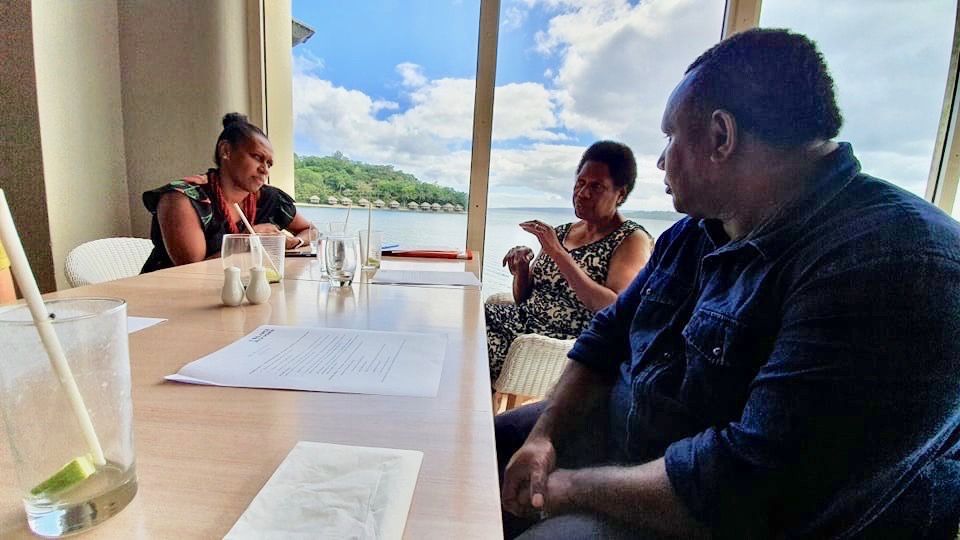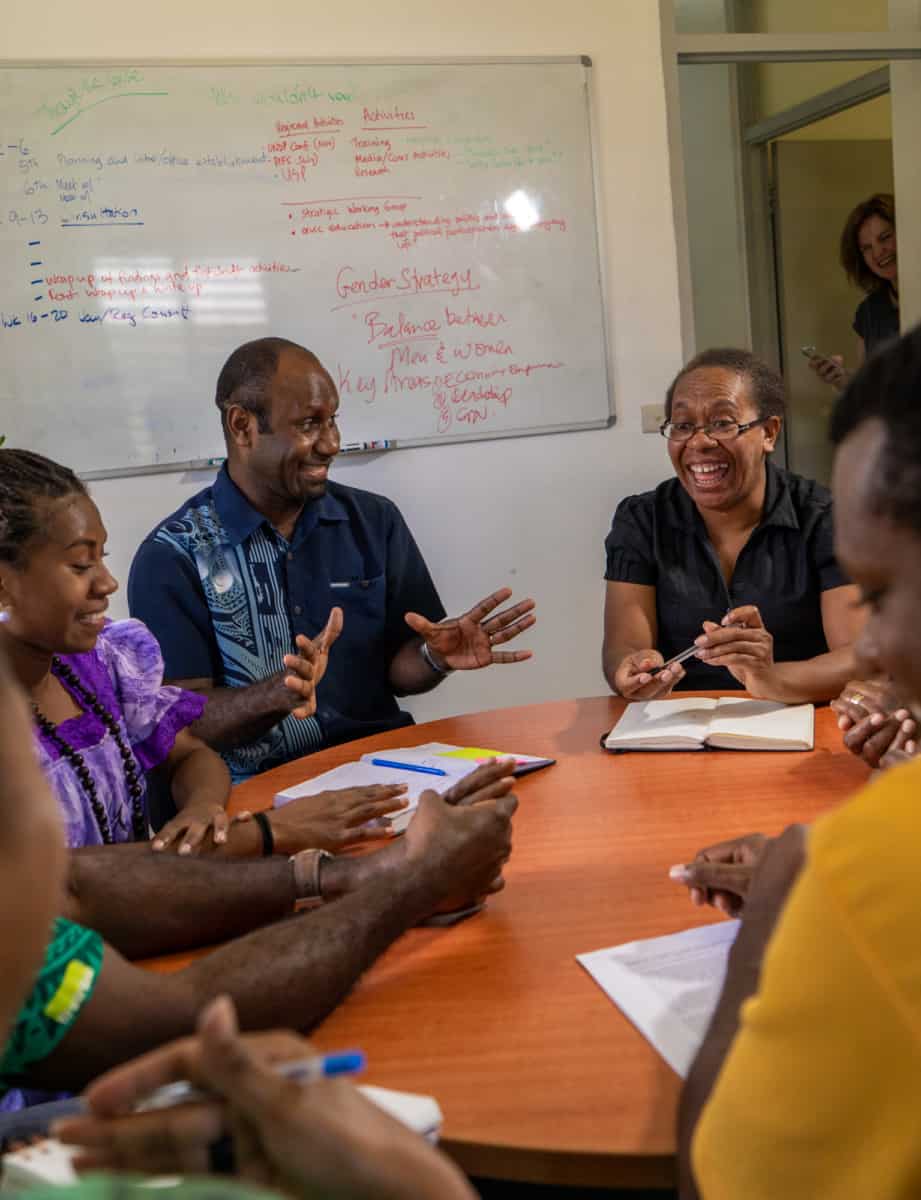Image: Vanuatu Skills Partnership Director, Fremden Yanhambath, in a planning meeting with the Director of the Department of Women’s Affairs, Rothina Ilo Nako.
(8 minute read)
As anyone currently working in the sector knows, the COVID-19 pivot has become the number one priority for all international development programs. Practitioners have been spending the last few months getting their DAKI (Drop, Adapt, Keep, Innovate) frameworks or equivalent in place as they realign their funding, work plans and technical assistance to respond to the economic and social challenges of the COVID-19 reality. Within the Australian context, the Government has just released its new development policy, reframed entirely around its COVID-19 response, and direct in its call for new ways of working.
In the face of unprecedented challenges for the aid industry – particularly the impact of international border closure – the need to do development differently is obvious. However, while this will mean a radical reshaping of approaches for many development actors and a spurning of conventional methods as emphasised in Australia’s new policy, there are some for whom this will not be such an overhaul; a number of initiatives were well practised and ready for the COVID-19 pivot long before it hit – and they provide valuable lessons to inform the new development future.
These unconventional programs were ready because of their essential characteristics that mirror the evidence produced by robust analysis on what makes development programs effective – in any complex, rapidly changing environment, COVID-19 or no COVID-19. This includes the research produced by the Developmental Leadership Program and the Problem Driven Iterative Adaptation-related research out of Harvard University’s Centre for International Development. These voices – somewhat in the wilderness – have been consistently demonstrating the inadequacy of traditional aid approaches to influence positive social change – evidence that has now become starker with the changes required by all countries in the face of a global pandemic.
As an independent consultant, I have the joy of working with two Australian Government aid programs whose design and ever-evolving practice is based on, and reflects, the development effectiveness principles arising from this body of research: the long-running Vanuatu Skills Partnership and the more recent Balance of Power multi-country Pacific initiative. While these programs are ostensibly different in terms of their focus and implementation modalities, they share three fundamental features that mean that savvy pivoting in response to COVID-19 is not a difficult move to make. And it is significant that each one of these features is underscored in Australia’s new policy framework.

Image: Locally-led cyclone recovery through the Vanuatu Skills Partnership
1. Adaptive management
While this has become a ubiquitous descriptor for aid programs, the difficulties faced by many to transition to a new operating environment and the apparent novelty of a DAKI process belie how true this actually is. This is in large part due to inflexible, risk-averse bureaucratic systems that demand pre-determined and locked-in budgets, human resources, work-plans and delivery instruments, requiring onerous amendment procedures should divergence from initial plans occur. However, thanks to the positive deviants within institutions who take a stand against rigidity and innovation-stifling institutionalism, authorising environments for adaptation can be created. It is this licence, trust and appetite for risk provided by power bases within the aid industry that enable more unconventional programs to emerge – those able to respond nimbly and entirely unexpectedly to the opportunities and ‘act now or lose forever’ innovation entry points of the fluid local context.
In the case of the Vanuatu Skills Partnership, deliberate cultivation of an adaptation-friendly environment well prior to COVID-19 enabled a small-scale training program to transform into a nation-wide governance initiative, influencing broad-based service delivery and institutional reform. In the case of Balance of Power in Vanuatu, this same flexibility enabled the immediate and unplanned mobilisation of an initiative that has catalysed the national media association to re-strategise for a more active and accountable role following the shocking general election result in March 2020, which saw, yet again, not a single woman elected to Parliament.
Come COVID-19 – and the double whammy of Tropical Cyclone Harold – this adaptation naturally continued, without fuss or fanfare and with the full support of donor and contractor allies. The Vanuatu Skills Partnership agilely shifted its resources to play a central role in the Provincial Emergency Operations Centres, functioning as the key service delivery facilitator for provincial governments across the country. Balance of Power, without skipping a beat, is now expanding its work with the media to capture the front-line action of women leaders managing the dual emergency, using the crisis as an opportunity to shift societal perceptions of gendered roles and leadership legitimacy.
Neither of these ‘pivots’ have required any change in the methodology and mentality of the programs’ ways of working; DAKI-ish frameworks were always what was required to monitor the non-linear and unpredictable processes inherent in responding to the constant evolution of the local context – the programs have now just changed the template title. Moreover, it would be highly risky to think that the adaptability needed going forward could be addressed through one COVID-19 pivot. This too will be a non-linear and unpredictable process, with ongoing reflection, navigation, and readjustment – now clearly supported by a development policy that has ‘new levels of flexibility’ and responsiveness as a core operating principle.
2. Local leadership
Both the Vanuatu Skills Partnership and Balance of Power are entirely and intentionally locally-led programs, the Partnership being the first ever Australian aid program to appoint a ni-Vanuatu into the role of a Team Leader in 2014. The intentionality rests on the irrefutable evidence that significant and lasting reform to institutions, social structures and inequalities simply does not happen unless driven and desired by local actors.
COVID-19 does indeed create a critical juncture for traditional development models ‘delivered’ by ‘expert’ outsiders, opening up new space for local development actors to assert greater ownership over humanitarian responses and development cooperation. However, no such critical juncture has occurred for programs that already knew that externally-driven aid initiatives are band-aids at best and underminers of local resilience, innovation and expertise at worse, as has been recently argued in relation specifically to the Pacific.
The local leadership and technical expertise underpinning the Vanuatu Skills Partnership and Balance of Power mean that there are only relatively minor tweaks needed to international technical assistance resourcing in a COVID-19 context. Any international consultants engaged through these programs are supportive, at times facilitative, but always under the technical direction of the politically-savvy, relationally-networked local management. Prior to COVID-19, their roles were already predominantly undertaken remotely with limited ‘doing’ in-country inputs required. The current closure of international borders therefore presents no significant impediment or substantive change in these programs’ usual ways of working and their resourcing structures.
Regrettably, this degree of localisation has not been the norm to date and as expressed in the new aid policy, a new focus on valuing, fostering and privileging of local knowledge and leadership is necessary. However, as captured in another recent study on Pacific perspectives of Australia, to be effective this will also require a concurrent focus on shifting pervasive relational power dynamics – from one where things are done ‘to’ and ‘for’ the Pacific to authentic partnerships and mutual respect – and a purposeful redress of the damage caused by perceptions of unilateral, outsider-driven aid.

Image: Director General of the Ministry of Justice and Community Affairs, Doresday Kenneth, in discussion with the Balance of Power Deputy Team Leader, Jennifer Kalpokas Doan, and Country Manager, Wilson Toa.
3. Collective Action
The need for new levels of collective action, cooperation, or ‘burden sharing and leveraging expertise’ as it is articulated in the new aid policy, is pressing as countries and regional bodies grapple with the unforeseen challenges posed by COVID-19. This is particularly the case for those aid-dependent countries in the Indo-Pacific region with fragile health systems, and the rapid departure of large numbers of aid program personnel. In Vanuatu, this includes an exceptional absence of foreign ‘surge’ assistance in responding to the humanitarian disaster caused by Tropical Cyclone Harold.
But good development programs have always realised that their primary value-add is precisely to be a convenor of disparate local actors, influencing and catalysing them to come them together as broad-based coalitions for change. Complex and entrenched social problems – COVID-19 or other – are rarely addressed through one particular group working in isolation; success is achieved through groups building allegiances, negotiating political settlements and realising that coming together to achieve a shared goal together doesn’t mean having shared views, processes, or even beliefs.
The Vanuatu Skills Partnership was ground-breaking in its early days of implementation in bringing together hitherto ‘never the twain shall meet’ worlds of business entrepreneurs, development anthropologists, government officers, grass-root communities, MPs, francophones and anglophones. Leveraging the specific networks, influence and skills of these diverse players in the local political economy – and responding to their distinct drivers and incentives – was fundamental to the systemic change that the Partnership effected in sub-national service delivery. Balance of Power, for its part, is explicit in its design intent to go beyond the ‘usual suspects’ of gender equality programs in order to achieve improved results; it is targeting alliance-building with the (mostly male) power-holders within the socio-political context – politicians, church and kastom leaders, as well as the media. Most of these partners would never previously have considered collaborating on anything involving ‘gender’, but are now buying into a change process they formerly negatively associated with ‘women’s business’ and foreign actors.
It is crucial that international development interventions are aligned to best support national and regional priorities, and it therefore follows that the sector is undergoing a comprehensive COVID-19 pivot. Nonetheless, it is the programs that have already deeply invested in embedding the principles of adaptability, local leadership and collective action that will be the best positioned to respond – both to this current challenge and to the new ones that will inevitably follow. In the context of Australian aid, with a new policy architecture that recognises and promotes these key principles, the time is ripe for lessons to be drawn from successful models to ensure that development cooperation maximises its ongoing relevance and impact in a profoundly changing world.










